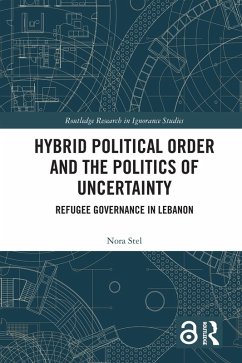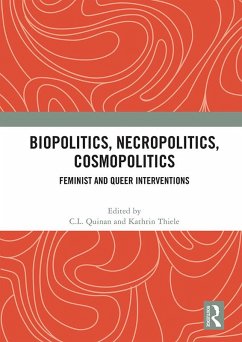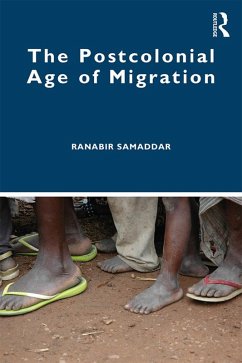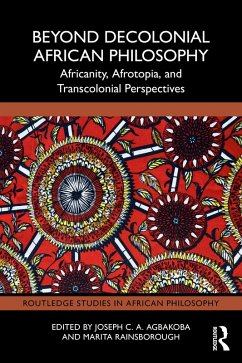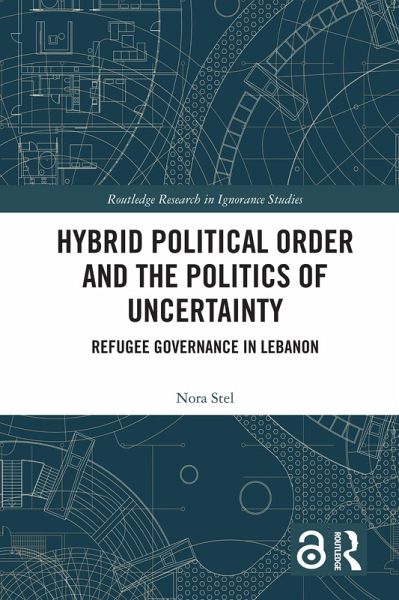
Hybrid Political Order and the Politics of Uncertainty (eBook, PDF)
Refugee Governance in Lebanon
Versandkostenfrei!
Sofort per Download lieferbar
40,95 €
inkl. MwSt.
Weitere Ausgaben:

PAYBACK Punkte
20 °P sammeln!
Lebanon hosts the highest number of refugees per capita worldwide and is central to European policies of outsourcing migration management. Hybrid Political Order and the Politics of Uncertainty is the first book to critically and comprehensively explore the parallels between the country's engagement with the recent Syrian refugee influx and the more protracted Palestinian presence.Drawing on fieldwork, qualitative case-studies, and critical policy analysis, it questions the dominant idea that the haphazardness, inconsistency, and fragmentation of refugee governance are only the result of force...
Lebanon hosts the highest number of refugees per capita worldwide and is central to European policies of outsourcing migration management. Hybrid Political Order and the Politics of Uncertainty is the first book to critically and comprehensively explore the parallels between the country's engagement with the recent Syrian refugee influx and the more protracted Palestinian presence.
Drawing on fieldwork, qualitative case-studies, and critical policy analysis, it questions the dominant idea that the haphazardness, inconsistency, and fragmentation of refugee governance are only the result of forced displacement or host state fragility and the related capacity problems. It demonstrates that the endemic ambiguity that determines refugee governance also results from a lack of political will to create coherent and comprehensive rules of engagement to address refugee 'crises.'
Building on emerging literatures in the fields of critical refugee studies, hybrid governance, and ignorance studies, it proposes an innovative conceptual framework to capture the spatial, temporal, and procedural dimensions of the uncertainty that refugees face and to tease out the strategic components of the reproduction and extension of such informality, liminality, and exceptionalism. In developing the notion of a 'politics of uncertainty,' ambiguity is explored as a component of a governmentality that enables the control, exploitation, and expulsion of refugees.
Introduction Chapter of this book is available for free in PDF format as Open Access from the individual product page at www.routledge.com. It has been made available under a Creative Commons Attribution-Non Commercial-No Derivatives 4.0 license.
Drawing on fieldwork, qualitative case-studies, and critical policy analysis, it questions the dominant idea that the haphazardness, inconsistency, and fragmentation of refugee governance are only the result of forced displacement or host state fragility and the related capacity problems. It demonstrates that the endemic ambiguity that determines refugee governance also results from a lack of political will to create coherent and comprehensive rules of engagement to address refugee 'crises.'
Building on emerging literatures in the fields of critical refugee studies, hybrid governance, and ignorance studies, it proposes an innovative conceptual framework to capture the spatial, temporal, and procedural dimensions of the uncertainty that refugees face and to tease out the strategic components of the reproduction and extension of such informality, liminality, and exceptionalism. In developing the notion of a 'politics of uncertainty,' ambiguity is explored as a component of a governmentality that enables the control, exploitation, and expulsion of refugees.
Introduction Chapter of this book is available for free in PDF format as Open Access from the individual product page at www.routledge.com. It has been made available under a Creative Commons Attribution-Non Commercial-No Derivatives 4.0 license.
Dieser Download kann aus rechtlichen Gründen nur mit Rechnungsadresse in A, B, BG, CY, CZ, D, DK, EW, E, FIN, F, GR, HR, H, IRL, I, LT, L, LR, M, NL, PL, P, R, S, SLO, SK ausgeliefert werden.




